5 IX 2022
5 IX 2022
maybe once a month is a bit too seldom to post? I kinda want to form a habit of romanticizing my academic life, I see all those studyblr accounts with beautiful photos of their desks and notes and I'm pretty sure those images exist in their minds as well

maybe one day I will be considered studyspo lol
I'm just starting to work on some geometry problems for today, haven't yet decided what I will focus on, but there is this one problem that haunted me when I tried to sleep yestarday:
given a triangle ABC with ∠A = 60°, let P be a point in the interior of ABC such that ∠APB = ∠APC = 120°. prove that ∠APX = 90°, for X being the circumcenter of ABC
it's supposed to be solved using spiral similarity, which is a composition of a rotation and homothety. there was another problem that was listed as "spiral similarity exercise", but I proved it with angle chasing exclusively, creating some nasty drawings in the process

other than geometry I'm studying homology, at the moment the basics of homological algebra, such as the first proofs by diagram chasing and exact sequences




I made some notes for exact sequences induced in homology
my perspective on doing math is slowly changing I think, I feel inspired to search for problems that I would like to solve. I noticed that I have this mental block: before I start doing math for real, I need to learn all the theory. which is absurd, you can never learn all the theory
sure, obtaining truly groundbreaking results requires years of learning theory and mastering tools if you want to specialize in algebraic topology and geometry, but the mindset I have creates the comfort zone of "play safe, just read your textbook, no challenges for now" and I'm starting to see beyond that
right now I'm taking my first steps into understanding that reading textbooks and learning how to solve basic exercises is not enough. they are just methods that are supposed to help my creativity and curiosity do their thing. essentially what I've been doing so far is not math, merely the preparation to do math in the future. no wonder I've been feeling so bored recently, all I'm doing is just learning basic tools. the idealist in me is asking to be unleashed
I feel like I'm about to see something much bigger than me
More Posts from Bsdndprplplld and Others
there are two levels to this I think
the first one is how do you know how much time someone spent mastering a skill? and how do you decide how much time is average, how much must be a talent? both those pieces of information can be known or computed, but I don't think anybody performs such an assesment for someone else in a casual conversation before saying "you're so talented"
the secone thing is psychological. it is much healthier to think of oneself as "alright-talentend, very hard-working" than very talented. that's mostly why I reblogged this post, to deal with anxious thoughts "what if I'm not talented enough?"
sometimes it requires talent to be able to master a skill at a certain level at all, we're talking fields medalists and famous classical soloists, but to be ok-good at something it often suffices to be a bit above average and hard working. in general talent usually allows to work faster. being praised for talent is unhealthy, I believe, even when someone who is obviously talented worked super hard to achieve their results
and yes, those who didn't master any skill can be very discouraged to try when there is a narrative that it's all about talent. thinking of it as "mainly hard work" spares the question of "am I talented enough?" and inspires to just go and try
"Wow you're so naturally talented!" "You truly are gif-" biting you biting you biting you biting you die die die die I didn't work for thousands of hours to get called naturally talented fuck you fuck you fuck you I wasn't a particularly gifted beginner I just didn't stop doing it aaaaaaaaaaaaaaaaaaa

The only thing that this university computer-science in-class-use file is dangerous to is my mental health, and the only thing it harms is my soul, but thanks for looking out for me google :)
tips for studying math
I thought I could share what I learned about studying math so far. it will be very subjective with no scientific sources, pure personal experience, hence one shouldn't expect all of this to work, I merely hope to give some ideas
1. note taking
some time ago I stopped caring about making my notes pretty and it was a great decision – they are supposed to be useful. moreover, I try to write as little as possible. this way my notes contain only crucial information and I might actually use them later because finding things becomes much easier. there is no point in writing down everything, a lot of the time it suffices to know where to find things in the textbook later. also, I noticed that taking notes doesn't actually help me remember, I use it to process information that I'm reading, and if I write down too many details it becomes very chaotic. when I'm trying to process as much as possible in the spot while reading I'm better at structuring the information. so my suggestion would be to stop caring about the aesthetics and try to write down only what is the most important (such as definitions, statements of theorems, useful facts)
2. active learning
do not write down the proof as is, instead write down general steps and then try to fill in the details. it would be perfect to prove everything from scratch, but that's rarely realistic, especially when the exam is in a few days. breaking the proof down into steps and describing the general idea of each step naturally raises questions such as "why is this part important, what is the goal of this calculation, how to describe this reasoning in one sentence, what are we actually doing here". sometimes it's possible to give the proof purely in words, that's also a good idea. it's also much more engaging and creative than passively writing things down. another thing that makes learning more active is trying to come up with examples for the definitions
3. exercises
many textbooks give exercises between definitions and theorem, doing them right away is generally a good idea, that's another way to make studying more active. I also like to take a look at the exercises at the end of the chapter (if that's the case) once in a while to see which ones I could do with what I already learned and try to do them. sometimes it's really hard to solve problems freshly after studying the theory and that's what worked out examples are for, it helps. mamy textbooks offer solutions of exercises, I like to compare the "official" ones with mine. it's obviously better than reading the solution before solving the problem on my own, but when I'm stuck for a long time I check if my idea for the solution at least makes sense. if it's similar to the solution from the book then I know I should just keep going
4. textbooks and other sources
finding the right book is so important. I don't even want to think about all the time I wasted trying to work with a book that just wasn't it. when I need a textbook for something I google "best textbooks for [topic]" and usually there is already a discussion on MSE where people recommend sources and explain why they think that source is a good one, which also gives the idea of how it's written and what to expect. a lot of professors share their lecture/class notes online, which contain user-friendly explenations, examples, exercises chosen by experienced teachers to do in their class, sometimes you can even find exercises with solutions. using the internet is such an important skill
5. studying for exams
do not study the material in a linear order, instead do it by layers. skim everything to get the general idea of which topics need the most work, which can be skipped, then study by priority. other than that it's usually better to know the sketch of every proof than to know a half of them in great detail and the rest not at all. it's similar when it comes to practice problems, do not spend half of your time on easy stuff that could easily be skipped, it's better to practice a bit of everything than to be an expert in half of the topics and unable to solve easy problems from the rest. if the past papers are available they can be a good tool to take a "mock exam" after studying for some time, it gives an opoortunity to see, again, which topics need the most work
6. examples and counterexamples
there are those theorems with statements that take up half of the page because there are just so many assumptions. finding counterexamples for each assumption usually helps with that. when I have a lot of definitions to learn, thinking of examples for them makes everything more specific therefore easier to remember
7. motivation
and by that I mean motivation of concepts. learning something new is much easier if it's motivated with an interesting example, a question, or application. it's easier to learn something when I know that it will be useful later, it's worth it to try to make things more interesting
8. studying for exams vs studying longterm
oftentimes it is the case that the exam itself requires learning some specific types of problems, which do not really matter in the long run. of course, preparing for exams is important, but keep in mind that what really matters is learning things that will be useful in the future especially when they are relevant to the field of choice. just because "this will not be on the test" doesn't always mean it can be skipped
ok I think that's all I have for now. I hope someone will find these helpful and feel free to share yours
One of my favorite thing I’ve learned about animals studies is that you should avoid using colorful leg bands when you’re banding birds because you can accidentally completely skew the data because female birds prefer males with colorful bands
Apparently if you put a red band on a male red wing blackbird his harem size can double
So like you can completely frick up the natural reproduction of a group of birds by giving a guy a bracelet so stylish that females CANNOT resist him
guy next to me at work is french and fucking insufferable about it. "chebyshev's inequality? i'm not familiar... do you perhaps mean l'inégalité de bienaymé-tchebychev?" "snell's law? i only know of snell-descartes.." every day he emails me a list of all fields medalists from l'école normale supérieure
Me, playing poker: Man, I fold
The sphere sat across the table: yes?
why is deciding on a title for my thesis so hard
when a pelican bites you there's no malice in their eyes. they aren't upset at you. they are just hungry and want to see if you fit in their mouths. and if you don't then it's no problem and everything is fine. and if you do then well i guess your fate is sealed but that's ok it's a beautiful animal
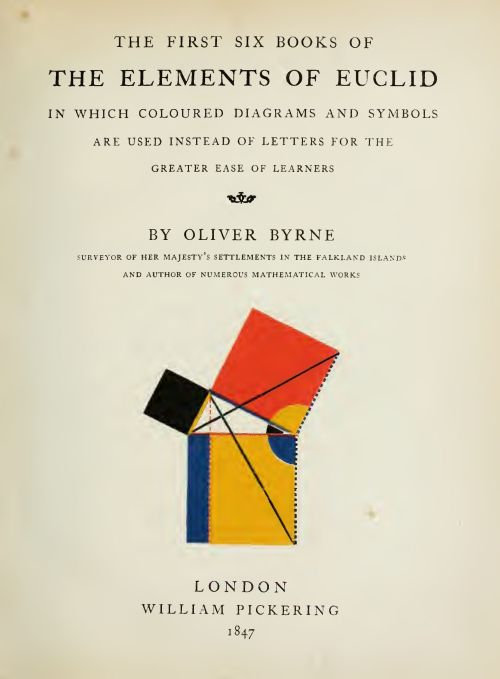
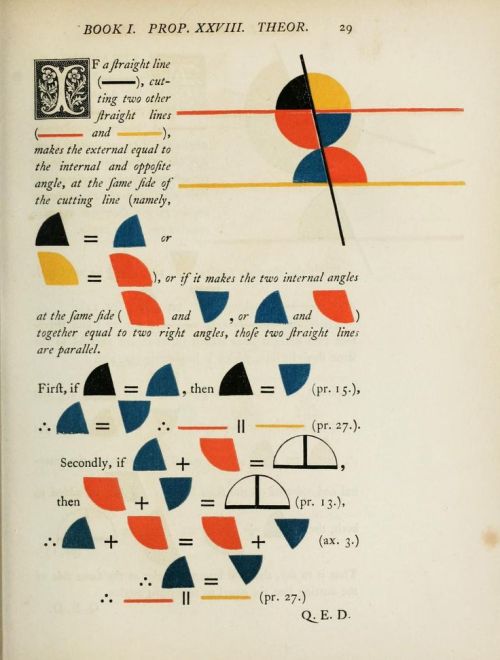
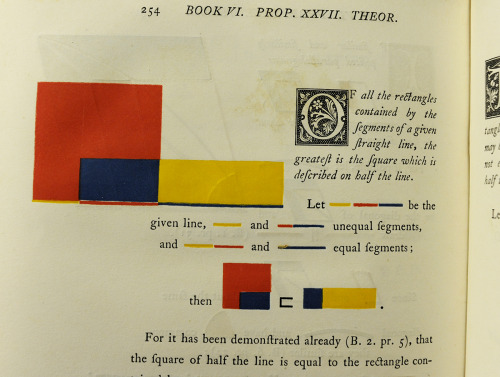
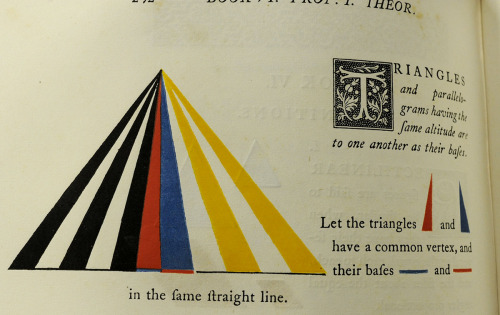
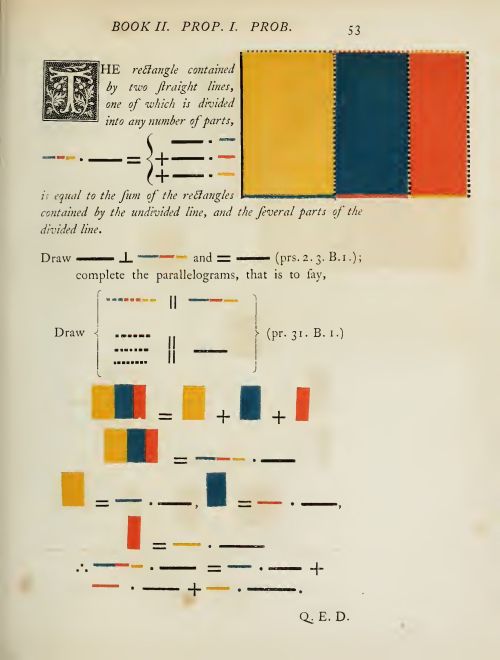

The beautiful modernism of Oliver Byrne’s, The First Six Books of the Elements of Euclid, 1847
15 V 2022
I have a topology test this friday, not gonna lie I'm kinda stressed. this is my favourite subject and I am dedicating a great deal of time to learn it so if I get a low grade it undermines the efficiency of my work. everyone thinks I'm an "expert", but internally I feel like I lied to them. it's ridiculous, because I can solve all the theoretical problems fairly well but the moment I have to calculate something for a specific example of a space I am clueless. and it's about applying theory to problems, right? so what is it worth
other than that tomorrow is a participation round in the integral competition at my university. I am participating. I don't have any high hopes for this, because it's been a while since I practiced integration and I am not motivated to do so because it's not an important skill – wolfram exists. either way could be fun, that's why I decided to go there
I am dreading the fact that I'll have to sit down and learn all the material from the probability theory until the exams. I've been ignoring it completely so far, because it's boring and complicated. the last homework broke me, it's high time to get my shit together
-
 sahelstudies liked this · 1 year ago
sahelstudies liked this · 1 year ago -
 elysianania reblogged this · 2 years ago
elysianania reblogged this · 2 years ago -
 jvvvm liked this · 2 years ago
jvvvm liked this · 2 years ago -
 kittenwivfangs liked this · 2 years ago
kittenwivfangs liked this · 2 years ago -
 itstoofashionable reblogged this · 2 years ago
itstoofashionable reblogged this · 2 years ago -
 bsdndprplplld reblogged this · 2 years ago
bsdndprplplld reblogged this · 2 years ago -
 struggling-with-space reblogged this · 2 years ago
struggling-with-space reblogged this · 2 years ago -
 struggling-with-delia liked this · 2 years ago
struggling-with-delia liked this · 2 years ago -
 booklindworm reblogged this · 2 years ago
booklindworm reblogged this · 2 years ago -
 booklindworm reblogged this · 2 years ago
booklindworm reblogged this · 2 years ago -
 booklindworm reblogged this · 2 years ago
booklindworm reblogged this · 2 years ago -
 faceless-ally liked this · 2 years ago
faceless-ally liked this · 2 years ago -
 faceless-ally reblogged this · 2 years ago
faceless-ally reblogged this · 2 years ago -
 witch--of--agnesi reblogged this · 2 years ago
witch--of--agnesi reblogged this · 2 years ago -
 when-soft-rains-fall liked this · 2 years ago
when-soft-rains-fall liked this · 2 years ago -
 mysticcherryblossompeach liked this · 2 years ago
mysticcherryblossompeach liked this · 2 years ago -
 angelogistics liked this · 2 years ago
angelogistics liked this · 2 years ago -
 p-locally liked this · 2 years ago
p-locally liked this · 2 years ago -
 scourgebrocademic reblogged this · 2 years ago
scourgebrocademic reblogged this · 2 years ago -
 khodorkovskaya liked this · 2 years ago
khodorkovskaya liked this · 2 years ago -
 scourgebrother liked this · 2 years ago
scourgebrother liked this · 2 years ago -
 shakshukagirl liked this · 2 years ago
shakshukagirl liked this · 2 years ago -
 bsdndprplplld reblogged this · 2 years ago
bsdndprplplld reblogged this · 2 years ago

⁕ pure math undergrad ⁕ in love with anything algebraic ⁕
292 posts